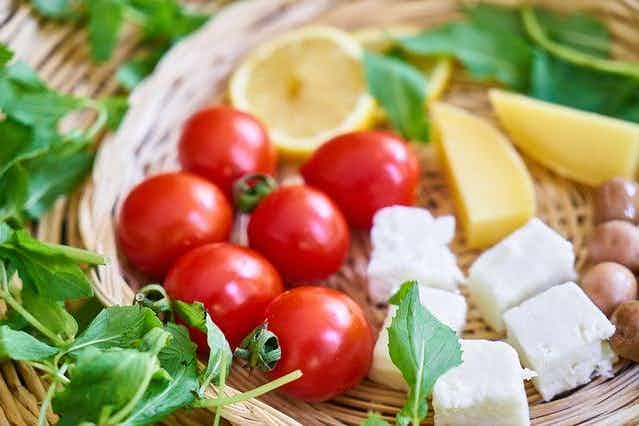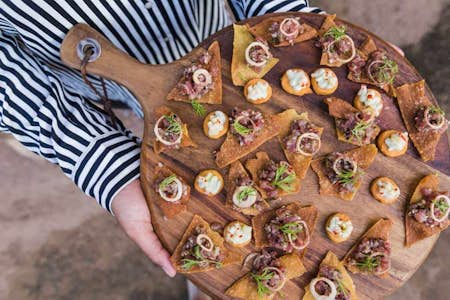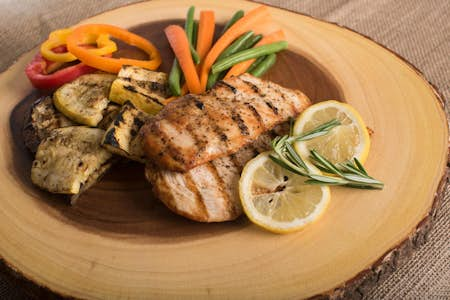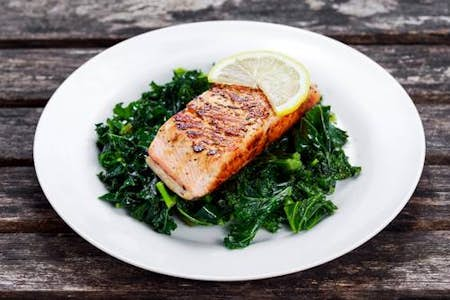Choosing a diet to follow can be a tricky process. It's essential to pick a diet that not only suits you and your lifestyle; you need to make sure you enjoy the food too! The Mediterranean diet has lots for you to love. It is a diet rich in fruits, vegetables, healthy proteins, and grains. This ensures you have a wide variety of foods to choose from and can create some delicious meals.
Frustrated with food waste or don't know where to start with a shopping list? Try a food subscription box to wash those worries away and put your diet - and finances - on the right track!
Whilst it may be easy to plan and prepare meals for lunch and dinnertime, it is often breakfast that is the struggle. Busy mornings leave little time for preparing complicated meals. At the same time, it is easy to get stuck into a rut eating the same foods every day. When you start to get bored of your food, you can begin to slip and allow yourself easy to grab foods that are often unhealthy.
You don’t need to get stuck having the same old breakfast day after day when you follow the Mediterranean diet. With a diet this rich in a variety of healthy foods, you are spoilt for choice. Whether you need quick meals for those busy days or prefer to slow down and take your time over breakfast, we have a few ideas for you to try.
What is the Mediterranean diet?
Before we get to breakfast ideas, let's look at the Mediterranean diet itself. The diet's early roots came in the 1950s when Ancel Keys carried out the Seven Countries Study. This study looked at the diets of countries around the world and the resulting cholesterol rates. The study has since been the subject of considerable debate, with many differing views of how useful the data is. This is due primarily to contention over the methods used and how the data has since been presented. While the debate surrounding this study continues, it did provide the basis for much of our current knowledge and research surrounding how health relates to our diet.
In addition to this study being the basis for the “Westernised diet”, there is another reason it is crucial when it comes to the Mediterranean diet. According to nutrition.org, when Keys compared poorer communities in Italy to other countries, he found they had much lower rates of heart disease and cholesterol. He surmised the link was the diet commonly eaten in Mediterranean countries.
Fast forward to today, and many people have tried and studied the Mediterranean diet. This has led them to believe that it can promote health and even help you to lose weight.
What foods are not allowed on the Mediterranean diet?
One of the best things about the Mediterranean diet is the sheer number of different foods you can eat. This is a diet where it is difficult to get bored, and a bonus is that the food and meals you can make are delicious. The result of this is a diet that you won't tire of quickly. You will feel full and will be enjoying the food too.
You can split the Mediterranean diet into a few food groups and can visualise them by taking a quick look at the Mediterranean diet food pyramid. Oldways created this in 1993 in conjunction with Harvard University. The pyramid makes it a little easier to see the foods you can eat and the lifestyle that goes with this diet.
The foods you can eat on the Mediterranean diet are lots of fruits, vegetables, legumes, nuts, seeds, potatoes, and whole grains. You can also add herbs and spices to add flavour. These are the food groups that make up the bulk of your meals.
In addition, you need to include healthy proteins and fats with each meal. These should come from fish, poultry, eggs, and dairy products like cheese and yoghurt. Then you can add in a little red meat and red wine in moderation.
You should avoid any heavily processed foods and those containing refined ingredients such as sugar and white flours. This includes sugary drinks, sweets, chocolate, ice cream, white bread, and even refined oils such as soy or canola oil.
You also need to avoid trans fats, which are in many kinds of margarine and processed meals. The key term is 'processed.’ If the food doesn’t look like its natural form, you should avoid it. Opt for whole ingredients and food that is still recognisable as a natural product instead. This means lots of cooking from scratch and avoiding ready meals or convenience foods.
What is a traditional Mediterranean breakfast?
In the Mediterranean, a traditional breakfast is a simple meal containing lots of leftovers mixed with fruits and vegetables. It depends on where you are in the Mediterranean, too. In Spain and Italy, you would grab yourself a strong coffee and pair it with toasted wholegrain bread with soft cheese. In other regions, you might have yoghurt mixed with some fruit and grains or even a breakfast soup.
When planning your Mediterranean breakfast diet meals, you can include some easy options such as toast and cheese. You can also make yourself some delicious meals to savour and enjoy slowly with your family. These range from delicious platters of meats and cheeses to breakfast bowls made from leftover grains and vegetables. These are perfect for weekends or for whenever you have the time to relax and enjoy your meal.
Mediterranean diet breakfast recipe ideas
There are plenty of options when it comes to breakfast. When following Mediterranean diet principles, you may also want to consider a few things, like:
- How much time you have.
- The foods you like.
- How long you will stay full.
A quick breakfast of wholegrain toast with butter might seem like a quick and easy option but might not keep you full for long.
Here are a few ideas for Mediterranean diet breakfast recipes for you to try.
Mediterranean breakfast bowl
A breakfast bowl is a little like a salad you eat for breakfast. You make this one using some of your favourite Mediterranean ingredients. It is delicious, filling, and full of ingredients you already have on hand. If you know you will be in a rush for breakfast, you can prepare this meal ahead of time and pop it into the fridge.
What you put into your breakfast bowl will depend on what you have and the types of foods you enjoy. Don't be afraid to mix it up and try any concoction of ingredients; this is just an idea of the type of things you could include.
Ingredients
- A boiled egg chopped roughly.
- Leftover potato chopped into bitesise pieces.
- Chopped cucumber.
- Olives – you can either leave these whole or cut them in half.
- Feta Cheese chopped into cubes.
- Leftover cold meats if you have any available.
- Olive oil.
- Salt and pepper and your favourite seasonings, we would suggest a little garlic and oregano.
Method
- Pop all your ingredients into a bowl and stir them gently to mix them up.
- Sprinkle your seasonings over the ingredients in the bowl to taste. A small pinch of each should be enough to add flavour without overpowering the meal.
- Drizzle a little olive oil over, and then give the ingredients another gentle stir.
- Either eat straight away or put the mixture into a container you can seal and pop it into the fridge.
Mediterranean breakfast cups
Mediterranean breakfast cups are a delicious meal that are easy to make and easy to eat. You can eat them while they are still warm or make yourself a batch and pop them into the fridge or freezer, so you always have an easy breakfast or snack on hand when you need it.
The basis of this recipe is egg mixed with a bit of dairy. You can then add your favourite ingredients to add flavour, texture and some extra nutrition. This version uses kale, goats cheese and bell peppers. If none of these ingredients appeals, you can change them up for almost any vegetable or meat instead.
Ingredients
- Ten eggs
- 150ml of milk. If you are trying to avoid dairy, you can substitute this for almond or oat milk.
- One bell pepper
- 100 grams of kale
- 50 grams goats cheese
- A pinch of garlic and salt
- A little oil
Method
- Prepare your veg by chopping the bell pepper into small chunks. These chunks need to be small because you will be mixing them through the egg. You want to get a good distribution of ingredients throughout.
- Chop your kale and crumble your goats’ cheese into smaller pieces.
- Pop all your eggs into a bowl. You don’t need to worry about mixing or beating them just yet.
- Add your milk and the garlic and salt.
- Whisk to combine the ingredients. You will end up with a smooth yellow mixture.
- Add in the prepared bell peppers and goats’ cheese and give the mixture another stir to combine the ingredients.
- Finally, you can add your kale. Add this last because it is the trickiest ingredient to get a good distribution throughout the egg cups. Stir the kale in and then move onto the next step.
- Brush a muffin tray with some olive oil. This ensures the egg cups slip out of the tray when cooked.
- Divide your mixture into the muffin tray sections. You should get between ten and twelve egg cups from this recipe.
- Pop the egg cups into the oven and bake for 25 minutes.
- Garnish with some fresh basil, parsley or chive and serve. If you don’t want to eat them straight away, you can pop them into the fridge for a cold snack at a later time.
Mediterranean breakfast smoothie
A smoothie is a wonderful way to start the day and ensure you get lots of nutrients into your daily diet. You can make some delicious smoothies that follow Mediterranean diet principles, too. This is one recipe that is tasty and even incorporates a little veg as well as fruit.
Ingredients
- 50 grams of oats
- 250 grams Greek yoghurt
- 100 grams strawberries
- One banana
- One cup of fresh kale
- One tablespoon of honey
Method
This is a simple breakfast to make and takes little preparation; if you have a blender and your ingredients, you're all set.
- Chop up your banana and kale into smaller pieces. You can use frozen fruit and veg or fresh.
- Put all your ingredients into your blender and blend until the mixture is smooth.
- Pour into a glass or travel cup if you need to make your breakfast on the go and then enjoy.
If you find it a little bland, you could try adding a pinch of cinnamon to give it a little extra kick. You can also add another tablespoon of honey if you need a little extra sweetness. This is a breakfast that is as versatile as you are. You can mix it up and include any of your favourite fruits, and make your own recipes to enjoy.
Mediterranean breakfast board
A breakfast board is as simple as it sounds. You grab all your favourite Mediterranean ingredients and pop them into the centre of the table for everyone to pick what they want.
The most important aspect of this meal aside from the food is the company. The Mediterranean diet encourages you to spend time with loved ones and take your time to eat together at the table. This meal is perfect for this.
Set your table and grab some platters. Wooden chopping boards or even plates work fine. Next, take a look in the fridge and cupboards and see what you have. An ideal breakfast board will have a variety of any of these ingredients.
- Raw vegetables chopped up into easy to eat portions.
- Fruits, such as grapes or apple.
- Add some cheese. You don’t want large amounts. Just enough to add a little dairy and fats to the meal. A variety of cheeses is perfect.
- Mediterranean dips such as hummus.
- Some wholegrain bread and butter.
- You can also add in whatever leftovers you have in the fridge from the day before. Healthy grain salads, falafel or cold meats work brilliantly, too.
- For drinks, you can serve water, fresh juice, and tea and coffee.
Once your breakfast board is ready, lay it in the centre of the table and call your family members to the table. Give everyone a plate and let them help themselves. This is a communal meal that brings you together as a family.
We also spoke to Siobhan Gale from Vegan Babe Life, who told us: "I quite like to keep things light in the morning and usually have either a smoothie or yoghurt with some fruit. On the weekends if I feel like something fancier ill have wholewheat toast with roasted tomatoes & vegan feta with fresh herbs. Something a bit more time consuming and filling."
More Mediterranean diet recipes
These are a few ideas, and you can adjust and vary them according to your likes and dislikes. If you are looking for more ideas on what to eat on the Mediterranean diet, there are many healthy recipes to choose from sites like BBC Good Food or Good Housekeeping.








